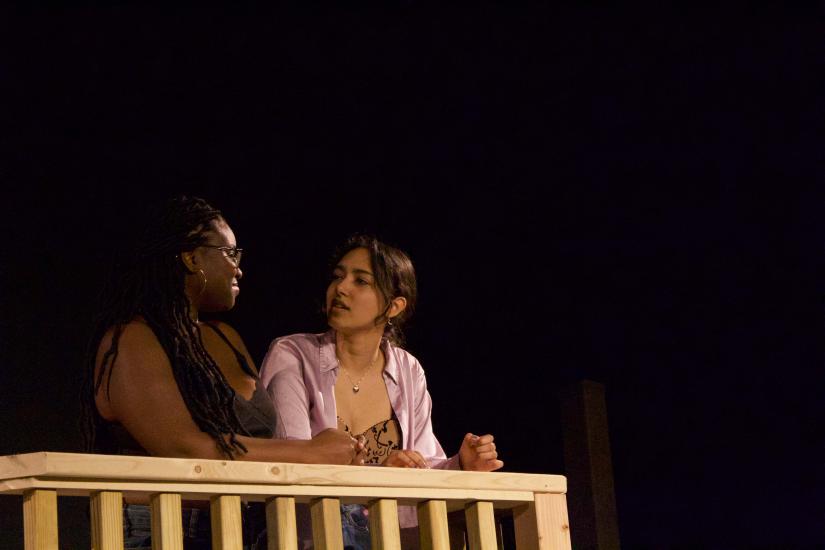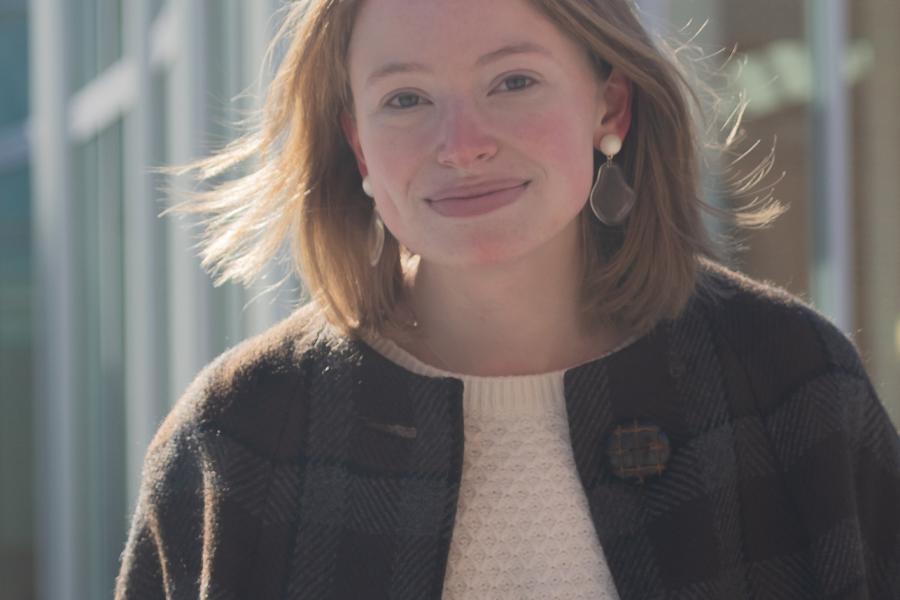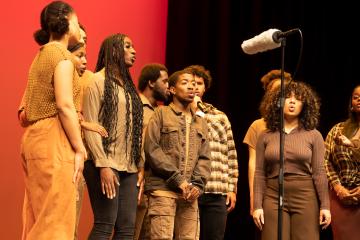Sigrid Edson understands the power of art—and theater, in particular—to bring to the surface emotion-laden topics like the loss of a first love or the anguish of a mental health crisis. After all, the new Johns Hopkins University alum has written three plays that capture the raw thoughts and feelings of these and other scenarios, endeavors that enabled her to receive this year's acclaimed Louis Sudler Prize in the Arts.
Created in 1983 by Chicago businessman and arts philanthropist Louis Sudler, the Sudler Prize is a $1,500 award given annually to a graduating senior or fourth-year medical student with demonstrated excellence in an art form outside of their major of study. This year, Edson is one of 14 students across the United States to receive the Sudler Prize, which goes to one recipient from Johns Hopkins University, plus one student each from Yale University, Dartmouth College, and Rice University, as well as one student each from 10 other academic institutions nationwide.
Edson, who earned a bachelor's degree in both sociology and international studies from the Krieger School last month, writes plays that explore life as a young adult in the LGBTQ+ community. Her three plays include A Delivery, presented over Zoom as a reading by the JHU student group Witness Theater in 2021; Raina's Spirit Leaves Her Body, a one-act play produced and staged by Witness Theater that same year; and untitled annoying sad theater teens, or This Is Supposed to Feel Good, a full-length play funded by the Taylor Theatre Fund's Playshop Grant and produced this past April by the university's Theatre Arts and Studies Program in the historic Merrick Barn's John Astin Theatre. Students and recent graduates who worked on untitled include stage manager Courtney Carreira, Class of 2023; technical director and rising senior Joshua Deck; and actors and rising juniors Zaris Newman (as Rachel) and Max Hsu (as Lincoln), and rising sophomore Lulu Hassanein (as Rebekah).

Image caption: A scene from 'untitled annoying sad theater teens'
Image credit: Phoebe More and Elena Echavarria
"Through my writing, I hope to tell stories that reduce isolation and immiseration of queer people," Edson said about her work as a playwright. "With the recent surge of legislation aiming to ban the discussion and existence of queer and trans people in public life, art that tells our stories must be funded, fought for, and spread widely, particularly beyond the LGBTQ+ community and beyond the professional art world."
In "untitled annoying sad theater teens," Edson delves into themes introduced in her earlier plays but in a more direct way. "While Raina had been meekly queer [in my earlier play], 'untitled' is unapologetic, telling the story of three gay young people seeking connection without any guide for how people like them are supposed to do so," Edson explained.
As a playwright, Edson is adept at writing authentic dialogue that conveys the awkward pauses and roundabout conversations that can come with a budding romantic relationship:
REBEKAH: I think you're trying to change the subject.
RACHEL: I'm changing the subject? What was the previous subject?
REBEKAH: If there's anything else going on with you that you want to talk about.
RACHEL: I think that falls into the mind-your-damn-business category.
REBEKAH: Then so does whether I think you're cute.
RACHEL: That's ridiculous. I'm setting a boundary where I don't share personal details with a stranger and you're, what? Flirting? Refusing to flirt? Both at once?
REBEKAH: Did Eva tell you I was gay?
RACHEL: You told me you were gay.
REBEKAH: Did I?
RACHEL: Nods. Beat.
Edson "effortlessly captures the voices of characters and can express huge, complex ideas in beautifully simple language," said Peg Denithorne, a lecturer in JHU's Theatre Arts and Studies Program who taught Edson for five semesters. "She writes so clearly and confidently about growing up gay or lesbian in today's society, and I truly believe that if she continues to write, she will write plays that may change the world."
For Edson, the work of writing about her own experiences and observations doesn't happen easily, and that is part of what makes her work worthwhile.
"It is a vulnerable project for me, particularly in how it deals with the intersection of sexuality, mental health, and trauma," Edson shared. "I am still making art that makes me afraid, and that is a good thing."
Posted in Arts+Culture, Student Life
Tagged humanities, awards









